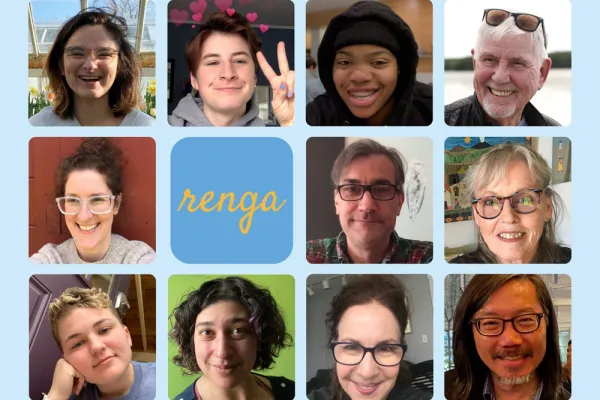Connecting Voices, Creating Poetry
Smith Arts

Published April 17, 2020
People around the world are finding creative ways to stay connected during the pandemic, from Tik Tok dances to Zoom-based yoga classes. Now, thanks to Smith faculty, students and staff, we can add poetry to the list. Floyd Cheung, vice president for equity and inclusion, English professor and published poet, recently approached Poetry Center Director Matt Donovan with the idea of engaging the Smith community in creating a poem about life in the time of COVID-19.
“I just thought it was a brilliant idea,” Donovan says. “Here was a way for us to be connected. Here was a way for disparate voices to come together and to share emotions and language.”
The result comes in the form of a poem known as a “renga,” a genre of Japanese collaborative poetry that became the basis for the modern haiku. A renga often focuses on a season and uses imagery from the natural word. One poet writes the first stanza, which is then sent to the next poet. Each poet writes two or three lines and has the option to write a complete thought or leave their contribution open-ended. Writers see only the lines that immediately precede their own.
For Smith’s renga, Donovan wrote the first three lines, and the honor of contributing the last section went to Ellen Doré Watson, former Poetry Center director and current Grace Hazard Conkling Writer-in-Residence.
The 30-line poem, titled “Voices from Afield Smith College Renga #1,” which appears below, is a hauntingly beautiful snapshot of life as we know it now. “I think all of us are essentially saying the same thing in this moment of feeling alienated and anxious and longing for something other than this,” Donovan says.
Cheung agrees. “I think most of us started to meditate on distance and connection, and wondering what are some of the human intersections with natural connection and disconnection,” he says.
As the title implies, this poem is only the beginning. Cheung and Donovan are hoping that others in the Smith community, including alumnae, will contribute to future rengas. “We want to be as inclusive as possible,” Donovan emphasizes. “What’s really important for us is that anyone who might be interested understands that no experience with poetry is required. It’s also not meant to cause more stress, so participants should plan on submitting their lines in the poem within 24 hours of receiving the preceding lines.”
Depending on the response and how many rengas are produced, there is the possibility of eventually creating a chapbook, which would stand as a unique document of this unprecedented moment in history.
In the meantime, Cheung’s personal take on reading poetry in general is inspiration enough to dive in right now. “Sometimes stress can make my mind spin faster and faster, and I get caught in an anxious spin,” he says. “Some poetry slows me down to notice an individual line or word or image. And that intentional slowing down can help me feel better.”
Smith students, faculty, staff and alumnae are encouraged to participate in the renga project. In addition, Poetry Center staff have put together a digital Poetry Center Care Package, which can be emailed upon request.
Voices from Afield
Smith College Renga #1
with stanzas from Matt Donovan, Clare O'Gara ’22, Rosetta Cohen, Ira Goga ’20, Floyd Cheung, Arda Collins, Sean Joyce-Farley ’20, Jen Blackburn, Allex Dawn ’21, Bill Hagen, Maggie Olszewski ’23, and Ellen Doré Watson
More news scrolling, yet more FaceTime,
mugs of ginger tea & the slow, dizzying work
of spring snow erasing the daffodil stems.
Sailboats on the Willamette River only touch
accidentally. We are suddenly similar to them,
moving stiffly across aisles and sidewalks, oar-arms
straight at our sides. Today, a somber hawk, perched low
on a stripped birch branch, watched us walk
with gold and burning eyes, but no sun to be seen.
Each day like a grey coat I take on and off
cocoons my grief and yet cracks open each night
with virtual choirs, phone calls, and time to read
the light in the trees across the afternoon
on the small hill tomorrow. What wouldn’t
be still spirals into the invisible
eddies spun by the dog’s lapping tongue
in the water dish. Who wouldn’t be
jealous of two birds
perching (not even) one wing's
full distance apart?
I watch them from my shattered glass window,
longing to escape my existence.
Clouds drift in a sunless sky,
the sweet scent of earth washes
memory from my mind.
Birds fly by in the shape
of a hand. All I remember is missing this.
Come here, little sinking heart. Yes, I used that word.
Look, the finches have turned from olive-drab
to lemon-yellow overnight. This is not nothing.
Pictured left to right: Maggie Olszewski ’23, Sean Joyce-Farley ’20, Allex Dawn ’21, Bill Hagen, Arda Collins, Matt Donovan, Ellen Doré Watson, Clare O'Gara ’22, Jen Blackburn, Rosetta Cohen and Floyd Cheung. Design Credit: Lauren Anderson